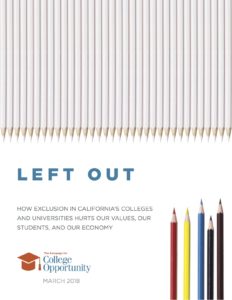 In 1996, California voters approved Proposition 209, which prohibited state-run entities – including public colleges and universities – from considering race, ethnicity, or gender in employment, contracting, and admissions to educational institutions. As a result Black enrollments in the most selective public colleges and universities plummeted.
In 1996, California voters approved Proposition 209, which prohibited state-run entities – including public colleges and universities – from considering race, ethnicity, or gender in employment, contracting, and admissions to educational institutions. As a result Black enrollments in the most selective public colleges and universities plummeted.
A new study by the Campaign for College Opportunity finds that these restrictions have a negative impact on the state’s students and economy. “Racially and gender diverse college leaders and faculty are key to improving success for all students,” the report maintains. And student success will lead to a more robust economy in the state, according to the report.
The study finds that 69 percent of all undergraduate students in California are from non-White ethnic groups. Yet, more than 60 percent of college faculty and senior administrative leadership posts are held by Whites.
In the University of California System, Blacks make up 5 percent of all undergraduate students. Blacks are 3 percent of the tenured faculty and 2 percent of the non-tenured faculty.
In the California State University System, Blacks are 5 percent of the students. Blacks make up 4 percent of the tenured faculty and 3 percent of the non-tenured faculty.
George R. Boggs, president and CEO emeritus of the American Association of Community Colleges, said that “if we really want to attract and retain a more racially and gender diverse faculty, staff, and administration, college leaders at all levels need the courage to make some changes in how searches and selection processes are conducted, and we need to be more engaged in mentoring promising and diverse future colleagues.”
The full study, Left Out: How Exclusion in California’s Colleges and Universities Hurts Our Values, Our Students and Our Economy, may be downloaded here.

